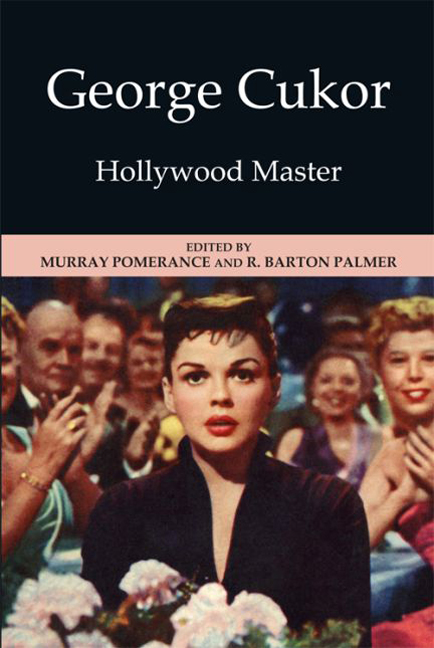Book contents
- Frontmatter
- Contents
- List of Figures
- List of Contributors
- Acknowledgments
- Introduction
- 1 Cukor's Tragicomedies of Marriage: Dinner at Eight, No More Ladies, The Women, and The Marrying Kind
- 2 George Cukor's Late Style: Justine, Travels With My Aunt, and Rich and Famous
- 3 Libel, Scandal, and Bad Big Names: It Should Happen to You, Les Girls, Camille, and Romeo and Juliet
- 4 The Cukor “Problem”: David Copperfield, Holiday, and The Philadelphia Story
- 5 Modulations of the Shot: The Quiet Film Style of George Cukor in What Price Hollywood?, Born Yesterday, Sylvia Scarlett, and My Fair Lady
- 6 Doubling in the Cinema of George Cukor: The Royal Family of Broadway, A Bill of Divorcement, A Double Life, and Bhowani Junction
- 7 George Cukor and the Case of an Actor's Director: Hepburn and/or Tracy in Little Women, The Actress, Keeper of the Flame, Adam's Rib, and Pat and Mike
- 8 Cukor Maudit: Tarnished Lady, Girls About Town, Our Betters, Susan and God, Desire Me, Edward, My Son, The Model and the Marriage Broker, Let's Make Love, and The Chapman Report
- 9 George Cukor's Theatrical Feminism: Gaslight, Heller in Pink Tights, A Life of Her Own, and A Star is Born
- 10 The Furthest Side of Paradise: Two-Faced Woman, A Woman's Face, Hot Spell, Wild is the Wind, and Winged Victory
- Works Cited and Consulted
- Index
7 - George Cukor and the Case of an Actor's Director: Hepburn and/or Tracy in Little Women, The Actress, Keeper of the Flame, Adam's Rib, and Pat and Mike
Published online by Cambridge University Press: 07 October 2017
- Frontmatter
- Contents
- List of Figures
- List of Contributors
- Acknowledgments
- Introduction
- 1 Cukor's Tragicomedies of Marriage: Dinner at Eight, No More Ladies, The Women, and The Marrying Kind
- 2 George Cukor's Late Style: Justine, Travels With My Aunt, and Rich and Famous
- 3 Libel, Scandal, and Bad Big Names: It Should Happen to You, Les Girls, Camille, and Romeo and Juliet
- 4 The Cukor “Problem”: David Copperfield, Holiday, and The Philadelphia Story
- 5 Modulations of the Shot: The Quiet Film Style of George Cukor in What Price Hollywood?, Born Yesterday, Sylvia Scarlett, and My Fair Lady
- 6 Doubling in the Cinema of George Cukor: The Royal Family of Broadway, A Bill of Divorcement, A Double Life, and Bhowani Junction
- 7 George Cukor and the Case of an Actor's Director: Hepburn and/or Tracy in Little Women, The Actress, Keeper of the Flame, Adam's Rib, and Pat and Mike
- 8 Cukor Maudit: Tarnished Lady, Girls About Town, Our Betters, Susan and God, Desire Me, Edward, My Son, The Model and the Marriage Broker, Let's Make Love, and The Chapman Report
- 9 George Cukor's Theatrical Feminism: Gaslight, Heller in Pink Tights, A Life of Her Own, and A Star is Born
- 10 The Furthest Side of Paradise: Two-Faced Woman, A Woman's Face, Hot Spell, Wild is the Wind, and Winged Victory
- Works Cited and Consulted
- Index
Summary
The more successfully you work through the actors, the more your own work disappears.
George Cukor, quoted in Gavin Lambert, On Cukor (1972), p. 188By his own statements, George Cukor resists the kind of analysis that tradi¬tional authorship study has fostered. Rather than devising a distinct style or pursuing a consistent set of thematically rich motifs, Cukor claims to serve the actor, his presence as an auteur dissolving in the process. And yet, considered in the context of recent scholarly discussion of film authorship, studio-era craft contributions, and screen performance, George Cukor's reputation as an “actor's director” commends him as an ideal case study. Never one of the auteur theory's “pantheon” directors, Cukor remained on Andrew Sarris's “far side of paradise” precisely because his talent seemed aimed at serving the material more than shaping it to his own purposes. And, as many Cukor scholars have pointed out, the material Cukor has served often existed on page or stage prior to its cinematic presentation. In 1971, Gary Carey calculated that of the forty-eight films Cukor had directed up to that point, thirty-four were adaptations. Equally revealing: over a quarter of Cukor's films feature actors as leading characters (9). Cukor's own theater training, established prior to his arrival in Hollywood during the first years of sound filmmaking, buttresses the tendency to see his work as invested inordinately in the appeal of acting; as Sarris notes, “even when Cukor's characters do not appear formally behind the footlights, they project an imaginative existence” (The American Cinema 90).
In interviews, Cukor would repeatedly affirm that he was not interested in asserting himself stylistically (through bravura camera movements or self-conscious editing [in Long 116; in Stevens Jr. 286]). And he differentiated himself from those directors thought to engage in extensive preplanning (such as Hitchcock) at the same time that he foreswore indulging improvisation by his actors. Instead, he asserted fidelity to the script as the logical starting point: “I start from the text, and, of course, I have a general idea about how the film should go. The things that happen on the set enrich it or change it or surprise me a little.
- Type
- Chapter
- Information
- George CukorHollywood Master, pp. 107 - 123Publisher: Edinburgh University PressPrint publication year: 2015



